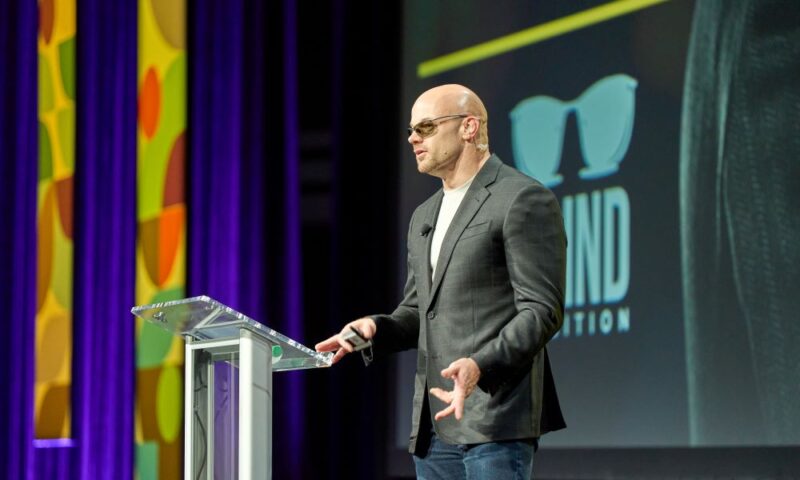
#ASAE23 Keynote: Five Keys for Cultivating “Blind Ambition”
In his keynote at the 2023 ASAE Annual Meeting & Expo on Monday, motivational speaker and author Chad E. Foster shared the steps association execs can take to change their perspective and grow their resilience.
Motivational speaker and author Chad E. Foster believes he is successful not despite being blind, but because of it. After losing his sight at 21 due to a genetic and degenerative eye disease, he chose to turn the problem into a solution by using a tactic he calls “blind ambition.”
“There’s a lot of disruption out there, but we’re also fortunate to live in an era where we have tools that can help us all achieve amazing things,” Foster said to attendees during his Monday keynote at the 2023 ASAE Annual Meeting & Expo. “The stories we tell ourselves can either keep us trapped or help us bounce back.”
As part of his keynote, he shared five pillars of “blind ambition” that association professionals can use to improve their vision not by looking around but by looking within.
Choose Your Response
After going fully blind in college, Foster said he didn’t want to spend his life blind as well as bitter. Though his blindness was guaranteed, his attitude was his choice.
“We need to be accountable for our lives,” he said. “If you don’t own your life, who will? You choose how to look at things. You hold that power to choose your perspective,” he said.
Foster likened the idea to playing a card game—no player gets control of the cards they are dealt, but every player gets to choose how they play their cards.
“Think about that when you choose how to show up on issues [facing your association] like burnout and retention,” he said. “Are you being intentional, or are you just reacting?”
Tell Yourself the Right Stories
Just as people choose how to react, they also choose their internal narrative. Foster shared that he could have told himself two things: that he was blind due to bad luck, or that he was blind because he had the strength to overcome it and help others.
“One story paints me as a victim, and the second is a Jedi mind trick that transforms my disability into my strength,” he said. “It means I can also deal with all the curve balls life throws at me.”
He urged association professionals to consider how they frame stories in their personal and professional lives.
“You become your stories, so make sure you choose your stories wisely and help your team do the same,” he said. “Get out in front of change to help your team create a narrative that powers them through challenges.”
Visualize Your Greatness
According to Foster, it’s important to visualize success and reaching goals in order to believe it will happen.
“It’s called cognitive reframing, [and it] means how you explain things to yourself in your mind,” he said. “As you learn to manage it, then it becomes the story.”
This concept plays an important role in effective leadership. Foster shared that leadership is about doing what you know you can achieve and leading others to do the same. He urged attendees to set goals beyond their expectations.
“The most significant factor affecting your performance is positive belief,” he said. “We’re all capable of more than we give ourselves credit for. So, how can you visualize greatness with diversity, equity, inclusion and accessibility? How can you make them work for you?”
Get Comfortable With Discomfort
For Foster, going blind forced him to improve his focus and determination. Living without any obstacles removes the opportunity for growth.
“If you never get outside of your comfort zone, you aren’t growing,” he said. “Life begins outside of our comfort zones.”
For associations, having a culture that’s comfortable with discomfort can prove helpful in several areas, including innovation and member engagement.
“By repeatedly moving toward discomfort, you learn to get calm in the face of fear,” he said. “The more comfortable you get with discomfort, the more you notice your comfort zone expand.”
Take Advantage of Disadvantages
When facing traditionally scary situations such as heights, Foster has found that being blind has given him an advantage.
“While most people are intimidated by the size of a ski slope, I’m just thinking about the next right turn,” he said.
Turing a disadvantage into an advantage can come in handy when you’re staring down a big goal that may prevent you from acting. In those situations, Foster recommends focusing on the next step.
“In my situation, despite my lack of eyesight, I can still innovate and participate in remarkable things in life,” he said. “Resilience revolves around our perspectives.”
(Nick Hagen Photography)






Comments